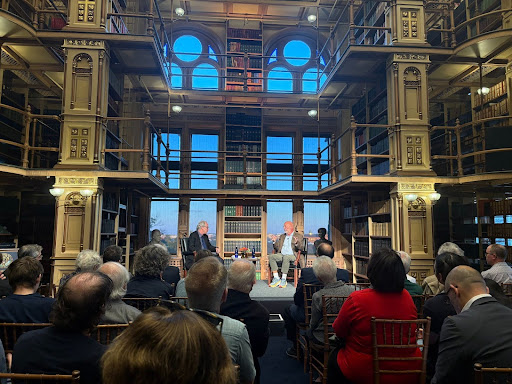A British-American conservative political commentator recounted his journey with Catholicism and his outlook on the state of liberal democracy at a Georgetown University event Oct. 20.
Speaking at an event for Georgetown’s Faith and Culture Lecture Series, Andrew Sullivan, formerly the editor of the U.S. politics magazine The New Republic, described the way his conservative beliefs have shaped his career over the past three decades. Sullivan reflected on how his Catholic faith has transformed throughout several stages of his life alongside his views on liberal democracy and conservatism.

Sullivan said conservatism should ultimately work toward preserving liberal democracy.
“That is a fragile achievement, very rare in the world, to have created a society which really is a liberal democracy,” Sullivan said at the event. “That is under threat. It’s currently eclipsed in this country. But conserving that is what conservatism should be, not the restoration of some order that can’t be restored without real authoritarianism.”
Sullivan has published six books and several influential political articles, including “Here Comes the Groom,” a defense of same-sex civil marriage, and “Goodbye to All That: Why Obama Matters,” in support of former President Barack Obama during his candidacy.
Joe Ferrera — Georgetown’s senior vice president and chief of staff who introduced Sullivan — said Sullivan’s writings bring a distinct perspective to politics and national events.
“Andrew’s writings engage the cultural and political events that have shaped our national landscape,” Ferrera said at the event. “He has brought a distinctive voice and clarity and suspicion of conventionalism to the full range of media in our time.”
Sullivan said fostering political dialogue is key to preserving liberal democracies’ futures, and new platforms, such as independent media, are increasingly important in creating these opportunities.
“We actually have potential for more complicated, more nuanced, more interesting thought out there, in a culture that is fast becoming, you’re either this extreme or that extreme and nothing in between,” Sullivan said at the event. “So we have the tools to win this polarization, to actually argue as a counter to the screening. And I’m just confident, as long as they don’t take the First Amendment away, that we will survive doing that.”
Sullivan said he plans to shift away from political writing through his forthcoming book “Credo,” which will focus on how Sullivan’s Catholic faith has transformed throughout the different stages of his life.
“I have no standing to write anything about Christianity,” Sullivan said. “So all I can really have standing to do is tell the story about how it came to me and how I stuck with it and how it’s taken very different forms and moods and dispositions in my life and changed dramatically and yet come back and then changed again. It’s a very complicated story.”
Sullivan said he felt angry toward God in 1993 as he witnessed a decline in his mother’s mental health and the death of many close friends from HIV/AIDS amid his own diagnosis with the disease.
“I’ve gotten through watching so many of my best friends die, very young, in horrible, horrible ways,” Sullivan said. “I thought I had the world in my hand, and all of it disappeared in a day.”
Sullivan said he took a break from the Catholic Church as he grappled with the implications of the church’s child sex abuse crisis in 2019, including the failure to address the defrocking of Cardinal Theodore E. McCarrick, who ran Sullivan’s parish in Washington, D.C.
“The sex abuse crisis, when it finally dawned on me what was actually going on, I did have a crisis in the church,” Sullivan said. “This person who had betrayed everyone in that parish had just been defrocked by the Pope, and no one in that parish felt even a responsibility to explain that, to talk about it, to air it.”
Sullivan said despite this, his unwavering belief in God is what helped him navigate through the messy, human elements of religion and unexplainable suffering.
“God, that’s how it happens,” Sullivan said. “There’s a crack in everything. That’s how the light gets in. And sometimes it’s our very brokenness that is the vehicle for our healing.”